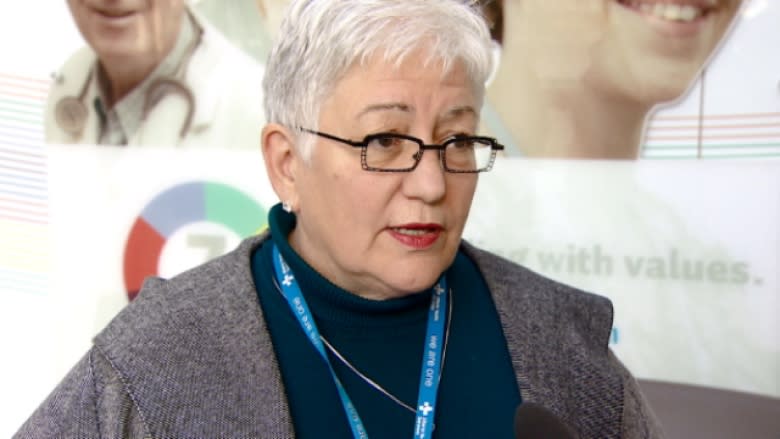Ebola diagnosis delayed after Air Canada refuses to transport blood sample
CBC News is dedicating a special day of coverage to the Ebola crisis on Tuesday. On radio, television and online, we'll explore the facts behind Ebola and answer questions. Be part of the conversation Tuesday by using #ebolafacts on social media or by joining our live chat on CBCNews.ca starting at 8 p.m. ET.
Health officials say an Air Canada pilot refused to fly a blood specimen from a patient suspected of Ebola from Edmonton to Winnipeg last weekend.
The refusal was part of a delay that ultimately slowed the patient’s diagnosis by more than 24 hours.
Sources tell CBC News the patient in question came into the emergency room of an Edmonton-area hospital midday on October 11.
Because the patient’s symptoms met the case definitions put forward by the province, the U.S. Center for Disease Control and the Public Health Agency of Canada, the patient was transferred to the University of Alberta Hospital – one of four treatment centres set up to deal with patients diagnosed with Ebola in Alberta.
At the second hospital, staff followed Ebola protocols, putting the patient into isolation and collecting a blood sample to be delivered to Winnipeg's National Microbiology Lab.
The Edmonton hospital then hired a courier to transport the blood sample to the Edmonton International Airport, where the sample was to be flown out on the next plane.
Because the call to transport the sample came in after hours, the lab was not able to use Purolator, its usual service – and instead called World Courier, which it had used successfully before.
But when World Courier arrived at the Edmonton International Airport around 10 p.m., sources say the sample was refused.
With no other options, the patient’s blood sample was then sent back to the lab at the University of Alberta Hospital for overnight storage, with a request that it be returned to the airport in the morning when more staff were on duty.
Hoping to avoid a repeat of the previous night, on Sunday morning World Courier called ahead to confirm airport staff would accept the sample.
At that time, the courier was told that Air Canada needed four hours' notice before the sample could be shipped out.
No one at the hospital was aware of the four-hour requirement, however, so the sample did not ship out in time to make the noon flight, said the source.
Instead, the sample was eventually booked on a 5 p.m. flight to Winnipeg, reaching the lab around 8 p.m.
It was not until midnight Sunday – nearly 36 hours after the patient first visited a hospital – that Ebola was ruled out.
Health Canada, Air Canada disagree on cause of delay
"It is my understanding that the pilot who was going to fly the sample had some concerns ... and there was a delay in getting the sample on board and off to a lab," said Vickie Kaminski, president and CEO of Alberta Health Services.
"Yes, we have had a particular challenge in transporting a sample," confirmed Canada's Minister of Health Rona Ambrose.
"In this particular instance, this was about misinformation and fear,” she added.
Speaking with Ambrose, Canada's Chief Public Health Officer Dr. Gregory Taylor said individuals involved in transporting the test materials have no reason to fear for their safety.
"It is a sample in a container and another container so it is very, very safe and meets rigid standards for shipment to make sure if it's dropped it doesn't leak out," he said.
“Whenever a province wants to ship an Ebola sample, ERAP [emergency response assistance plan] is activated and we go through a process with Transport Canada with standards that we helped establish.”
Taylor said Ottawa has followed up with Air Canada about the issue, and that health officials and Transport Canada are working to make sure that there are no other problems when it comes to transporting blood.
Air Canada, however, told CBC News the sample arrived too late on Saturday to complete safety checks, and that it was not packaged correctly when it was brought in on Sunday.
“Air Canada routinely handles the shipment of diagnostic samples to laboratories for testing,” said the airline spokeswoman Angela Mah in an emailed statement on Friday afternoon.
"There are understandably very strict protocols for transporting these items, requiring more than 65 specific items that must be checked for compliance in order for us to accept these for safe carriage."
But AHS spokesman Kerry Williamson disputes Air Canada's claims the packaging was the problem.
"We are unaware of any issues with the packaging of that sample. We are confident the sample was packaged correctly," he said. "Packaging of such samples is performed by highly trained laboratory technicians, who ensure packaging requirements are met."
Delay highlights problem with system, say sources
This was not the first time the University of Alberta lab had sent an Ebola sample to Winnipeg for testing.
According to CBC's sources, samples in the past have been sent without needing four hours notice.
The significant and unexpected delay left both the patient and hospital staff feeling anxious and ill-prepared.
"It is frustrating to see a whole day’s delay, but we assume a patient is positive until proven otherwise, so all of the positive measures were put in the day before,” said one of the health-care workers involved in the patient’s care.
"We treat the patient as if they are positive, work to minimize anxiety and to minimize any risk of transmission."
Dr. Stan Houston, a professor of infectious disease and public health with the University of Alberta, was one of the doctors who treated the patient.
Houston said the complex protocols in place to screen for Ebola may have contributed to the delay in diagnosis.
"I circulated a timeline of just what happened from the time of the patient's presentation until their diagnosis and highlighted some concerns," he said.
Apart from the delay in determining test results, Houston said workers’ efforts to isolate and treat the patient were effective.
In particular, he commended the unit’s addition of a trained staff member dedicated to ensuring health-care workers follow safety protocols in changing in and out of protective equipment.
“It’s so complicated and doing it right is key – and we had support to do it right. That made me feel really comfortable and confident about being involved in the patient’s care safely.”
In the future, Houston said some of the delays seen in this case could be avoided by collecting a blood sample as soon as a patient arrives in hospital, rather than waiting for their transfer to one of Alberta’s main Ebola treatment centres.
Earlier this week, several health-care workers in the province complained about lack of training and protective equipment available to staff working with potential Ebola patients.
Province hopes to take over more local testing
Kaminski, of Alberta Health Services, said the incident has highlighted the importance of improving local blood testing.
"We can't afford delays," she said.
"I understand public health concerns and safety concerns, but I also think that we need to be looking at how we can reassure people … How do we get information to them that makes them feel comfortable and understand that they are safe when we’re asking them to do these procedures?"
"Right now, given [that] Ebola testing is so specific, we’re looking at what we can do here," she said.While Kaminski said some local testing is available in the province, Alberta still relies heavily upon the main Winnipeg lab for Ebola testing, something she hopes will change in the future with the new lab services being introduced.
“If we can bring new tests in, we'll be able to accomplish much more of that testing in the province for ourselves.”
Until then, she said, Alberta will remain dependant on public transport to ship blood tests of this nature out of province.




